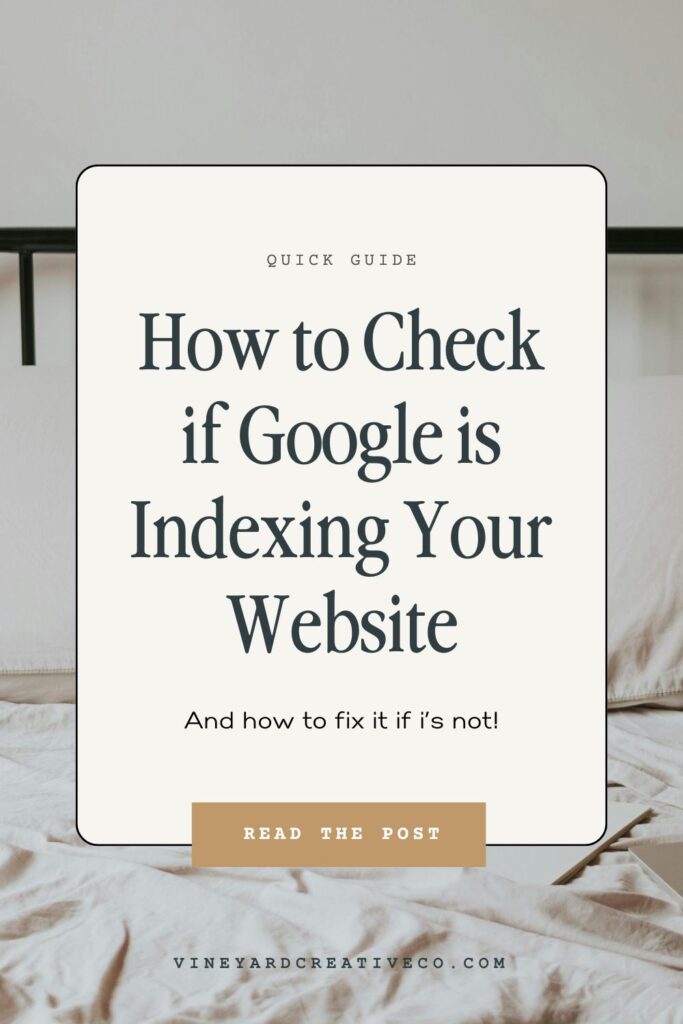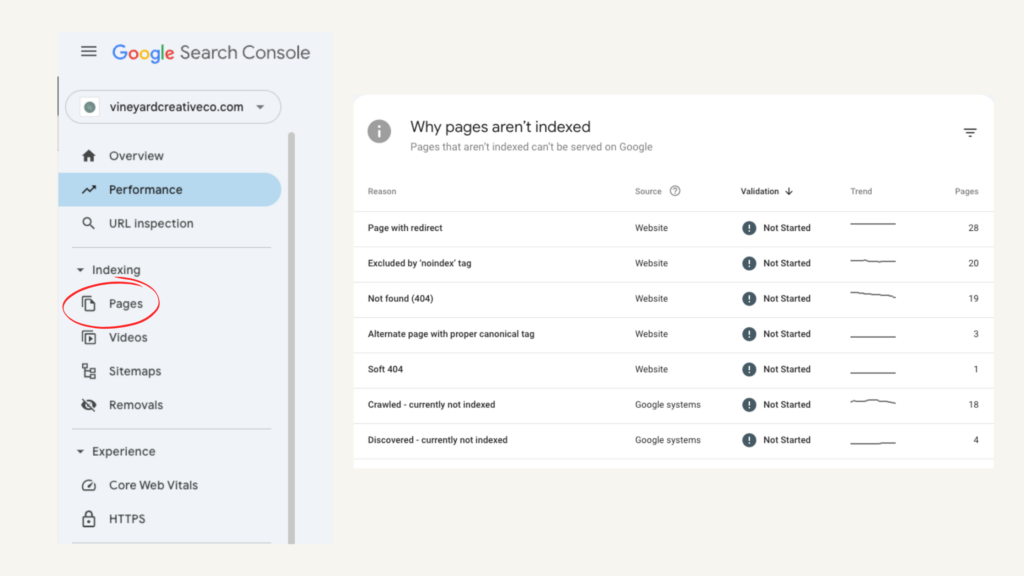Your resident Showit brand and web designer. I've helped dozens of creatives stand out online and create a sustainable digital presence.
I'm Laurel.
MY FAVORITE RESOURCES
WORK WITH ME
Browse the SHOP
Even if you don’t know much about SEO, you probably understand that Google has a system for deciding what pages appear in search results, if at all. That process is called indexing. And it’s super important for you to earn organic traffic from search engines. Understanding how Google indexing works is crucial for any business looking to succeed in online search.
And that’s what we’re going to talk about today. I’ll help you find out if Google is indexing your website, common issues why it might not be, and how to fix problems so you show up in search results faster. Let’s dive in!
📌 PIN FOR LATER 📌

What Does It Mean for a Website to Be Indexed?
Indexing is kind of like an approval process that each page of your website goes through before it can be shown in search results. Google first has to discover the page. Then, it crawls the page to understand the content. It also follows any links on the page to discover even more pages on your website. Then, it adds the page to its database by indexing it. Without indexing, your site isn’t visible in search results so it’s almost impossible for users to find you organically.
I know SEO can get a little technical, but hang in there! I’ll walk you through step-by-step how to ensure your website’s Google indexing is happening.
2 Ways to Check if Google Is Indexing Your Site
Let’s find out if Google is currently indexing your website!
Google Search Method
This method is super easy! Simply type site:yourdomain.com into a search query. This will narrow down the search results to ONLY pages on your website.
If your website appears, that’s great! This means that Google is indexing your website and approving pages to be shown in search results. You might not see every page on your website, which we’ll talk about in a second. As long as you see some of your main pages in the search results (home, about, services, contact, etc.), you’re good for now!
If your site isn’t appearing in search results, there may be an issue with Google indexing your pages. It either doesn’t know your website exists, or some issues prevent Google from approving your web pages for search results.
Google Search Console
Google Search Console is where you can manually request Google to index your website and address any issues it has flagged for review.
Once you create a free account and log in, navigate to ‘pages’ on the left side of your screen. Here, you’ll see how many of your pages are and are not indexed. If you scroll down the page, you’ll see why pages aren’t indexed. It’s not always an error that causes pages not to be indexed, so you’ll need to look into it more to see if you need to address any issues or if pages are supposed to not be indexed.

Here is what some of those flags mean. You can review a full list of reasons why your pages may not be indexed here.
- Not found (404): This page resulted in a 404 error. You’ll need to create a 301 redirect link if the page URL has changed. You can ignore this issue if the page no longer exists.
- Alternate page with proper canonical tag: You have an alternate of another page on your website, typically for use on a different device. Since the original page is indexed, there’s nothing you need to do.
- Soft 404: A soft 404 is when a URL tells the user that the page does not exist and also has a 200 (success) status code. These often appear when you forget to disable a page that doesn’t exist anymore or to create a redirect to the new page.
- Crawled – currently not indexed: Google has crawled the page but hasn’t indexed it yet – it could still happen!
- Discovered – currently not indexed: Google has discovered the page but hasn’t crawled it yet. You’re still in the queue to be crawled.
Google Search Console is an amazing tool for quickly getting your web pages indexed and in search results.
Common Issues That Prevent Indexing
After running your website through Google Search Console, you’ll discover why Google chose to not index your website. These are some common issues that prevent indexing and how to fix them!
Noindex tags.
The ‘noindex’ tag is an option on the backend of your website for pages you don’t want indexed, such as your privacy policy page. You don’t want to rank for that page because it’s irrelevant to your main offerings. In that case, you want the ‘noindex’ tag, and it’s okay if Google Search Console flags it because it was intentional. If you do want pages to appear in search results but it has the ‘noindex’ tag, you’ll need to log in to your website and uncheck the box that excludes them from indexing.
Missing or incorrect sitemaps.
You have to submit your sitemap, or a layout of your entire website, to Google. A missing sitemap is one of the biggest reasons why you might not see your website in search results at all. Google doesn’t know your website exists!
To submit your sitemap, follow these steps.
- Find your sitemap in one of these places:
- https://yourdomain.com/sitemap
- https://yourdomain.com/sitemap.xml
- https://yourdomain.com/sitemap_index.xml
- Once you find your sitemap, log in to Google Search Console.
- Navigate to ‘sitemaps’ on the left-hand side.
- Paste your sitemap in the search bar.
Google will take some time to review your submitted sitemap. Once approved, Google will start discovering, crawling, and indexing your website.
Slow site speed.
Google HATES slow websites! Users expect pages to load in under two seconds, and search engines expect the same thing. It could refuse to show slow pages in search results. You can find and fix site speed issues using PageSpeed Insights.
Duplicate content issues.
This happens when identical or very similar content appears on multiple pages of your website. When Google finds duplicate content, it struggles to determine the difference between them and which version is more relevant, which can lead to problems with indexing. Avoid creating duplicate content by not copying/pasting content between pages or using the same metadata for different pages.
How to Ensure Your Site Gets Indexed
Submitting your sitemap (if you haven’t already) is a great place to start. You can also manually request indexing in Google Search Console. If you fixed an indexing issue, you can search the URL in Google Search Console and then click ‘request indexing’ to push the page to the top of Google’s list of pages to index. In my experience, it typically takes a day or two for the page to be indexed, as long as there aren’t any issues.
Following SEO best practices also helps your pages get indexed faster. The more authority you build with Google, the more it starts to trust that the pages you publish are high-quality and relevant for users.
Whew! I know that was a lot of information. If you need help navigating these tools or processes to ensure Google indexing is happening, feel free to reach out! I’d love to help your website show up in search results.
Is Google Indexing My Site? How to Find Out
January 16, 2025
Date published:
Filed under

AFFILIATE DISCLOSURE
Some links across my website may be affiliate links, meaning I receive a portion of any sales made through them. I never recommend any product or service that I don't wholeheartedly believe in and use in my own business.
Leave a Reply Cancel reply
LOVE What You Just Read?
☕️ buy me a virtual coffee!
I love supporting you with free resources like this! Keep the creativity going and throw some caffeine my way if you want 😉
The Newsletter that
you'll actually want to open
Each week I share design and marketing tips, a roundup of my favorite resources, and an inside look at entrepreneurship the slow way.
get weekly growth tips in your inbox
work with me learn from me
Vineyard creative co is a brand, web design and marketing agency serving creative service providers. Based in Cincinnati Ohio, serving clients worldwide.
student login
Join the Slow Growth Club
weekly sustainable marketing tips, trends and heart-to-hearts from one creative to another